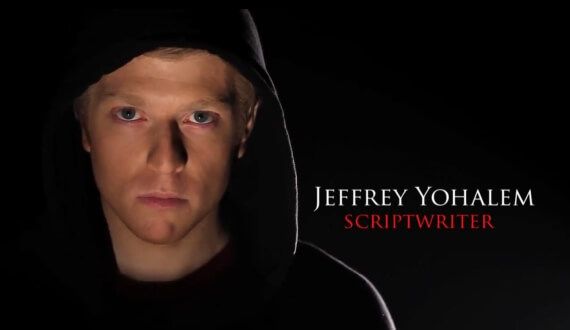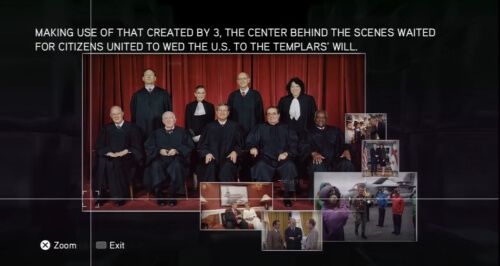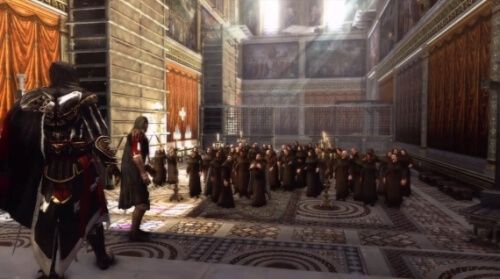For those who have already picked up their own copy of Assassin's Creed: Brotherhood, it's clear that Ubisoft is not afraid of venturing into serious political waters. The previous games in the series have had quite a lot to say about the Crusades, religious division, capitalism, meritocracy in church hierarchy; all topics that most video game studios would shy away from.
Now Brotherhood's lead writer Jeffrey Yohalem has revealed that while his writing is at times an injection of humor or satire into dry historical exposition, there is no shortage of criticism when it comes to legislation passed under both President George W. Bush and President Barack Obama.
Yohalem spoke to Kotaku at length about his motivations for political satire, as well as how he sees the narrative of Brotherhood as analogous to many issues in today's political arena, and a means to deliver a better message.
While the immediate assumption may be that a writer is using a game to slant a political ideal in the direction of his own personal views, the fact is that Yohalem, a former intern at The Daily Show has taken the opportunity to do what any good art seeks to: educate as much as it criticizes.
In the case of Brotherhood, shedding light on the influence of private corporations in American politics, while also educating youth on the dangers of entitlement.
Although Ubisoft is a French company, Yohalem is a Yale-educated American who traveled to Montreal to work for the game studio that had developed a game that truly moved him: Prince of Persia: Sands of Time. After getting into the studio, Yohalem began work on Rainbow Six Vegas 2 and eventually Assassin's Creed 2 in 2009. After being given freedom to design the story behind AC 2's hidden areas, Yohalem was promoted to the role of lead writer for Brotherhood, and his commitment to explore areas unchecked continued.
Assassin's Creed 2's hidden puzzles dealt with a variety of portraits and text that implied great historical figures like Joseph Stalin and Mahatma Gandhi were in fact members of the great struggle between the Templars and Assassins. As these were little more than secret bonus areas, it was clear to players that the famous individuals were being used for humor, or a historical nod, and not being lampooned or criticized in any way.
With Brotherhood, Yohalem changed his outlook, seeing the franchise as an opportunity to say something about the moral and ethical problems found in modern powers at a time when they would still be relevant. It is a compliment to the series that Yohalem felt that the next installment in the Assassin's Creed series could be:
"a video game was that was talking about modern day politics, instead of all these cheesy stories that pretend to be about reality but use fake names in different time periods.
"That was really my intention to do something that had never been done in video games before, that dealt with topical issues that video games hadn't been able to do in the past because they take so long to develop....Anything current always ends up falling apart before the game is done."
Anyone who has watched the Assassin's Creed: Brotherhood developer diaries knows how passionately the game's scriptwriter speaks about both the story and its protagonist. Given the current political issues regarding universal health-care, big business vs. regular citizens, and corporations becoming more and more powerful in the election of officials, it's easy to understand why a video game writer would inject his own frustration into a game dealing with many of the same issues.
For example, many of the secret puzzles featured in the second game were designed around the concept of scanning a famous portrait of a historical figure for a hidden point, and the player would succeed when that point was located.
In Brotherhood, Yohalem replaced deceased figures with collages of current public figures like former Secretary of State Condoleezza Rice, former Secretary of Defense Donald Rumsfeld, former Vice President Dick Cheney, and even the former President George W. Bush himself.When the player scanned over the figures, quotes would be revealed regarding their support of corporate rights and interests over that of the public.
These figures are certainly no strangers to public criticism, but Yohalem was merely reciting their own words, along with those of the Supreme Court to draw attention to a current political issue that shares a connection to events in the game. Don't assume that these bits of satire made it into the game without being seen, since Yohalem commends his superiors at Ubisoft Montreal for their "bravery" in allowing most of them to be approved. Apparently, some criticism of French President Nicolas Sarkozy had to be removed for fear of a lawsuit.
It's not totally uncommon for the plot and theme of a game to mirror real world events and figures, but actually naming them is rarely seen by studios and publishers seeking to avoid any negative publicity. Yohalem wanted to take the opportunity to teach American youth something about the world, and not to expect great things based on potential alone. This is mirrored in Ezio's need to climb to power following the fantastic events of Assassin's Creed 2. In Yohalem's eyes, the presence of Machiavelli in Brotherhood got him thinking about what kind of message he wanted to give young people in regards to the real cost of leadership:
"I wanted to discuss leadership today, because I feel like a lot of kids coming out of school today feel that just making a charismatic speech means that you're a leader...I think Obama has kind of proliferated that too: The idea that you can just wow people with this really good speech and you can write some really good letters and you're the head of your company, right? You just start a company and that's it...
"I feel like now kids are taught in America you can be anything, do anything – everyone in your class is your equal – and it's all about whether you're smarter than them or not. And I think the workforce is not structured that way at all. Kids come out of college, encounter the workforce and this power hierarchy they're not used to and they have no idea how to gain levels in that power hierarchy. I think it's incredibly frustrating both for them and the people who are currently employed."
Who would have thought that a game seemingly based around executions and stealth would have so much to say about today's world? We've spent some time thinking about the relationship between games and literature, as well as other periods of world history that the Assassin's Creed series could explore, so we're well aware of the unique abilities the development team at Ubisoft has.
At the end of the day, the game has sold spectacularly well, and been praised for its action and story. So the satire and commentary that Yohalem has brought to the franchise clearly didn't put off fans, and this relevance to today's world may even be part of the overall evolution of the series that Ubisoft is planning. We won't know until Ubisoft's next mysterious Assassin's Creed title comes next year.
Do you agree with Yohalem's idea that writers can have much more freedom where videogame writing is concerned, due to the sentiment that it's really only secondary to the actual gameplay? Or would you rather politics and lectures are kept in the classrooms and Congress?
You can see Yohalem's political theories and opinions in action today by picking up Assassin's Creed: Brotherhood on PS3 and Xbox 360.
Source: Kotaku



